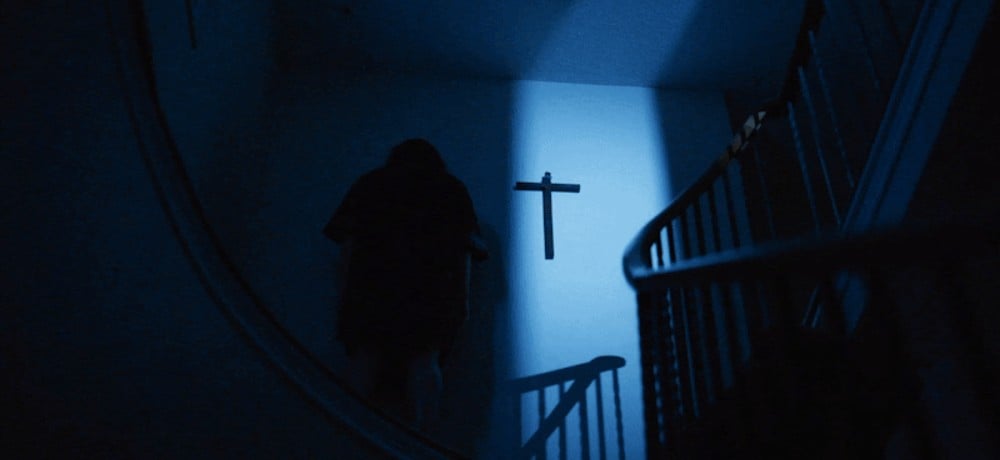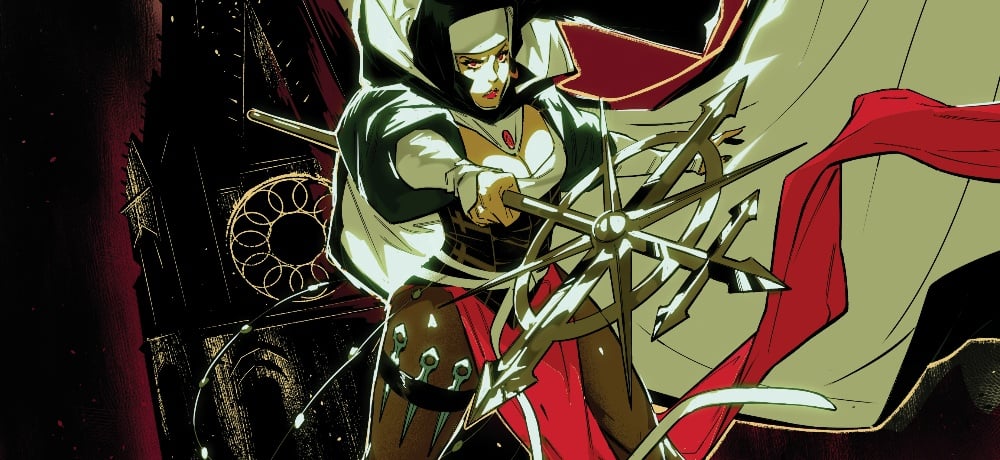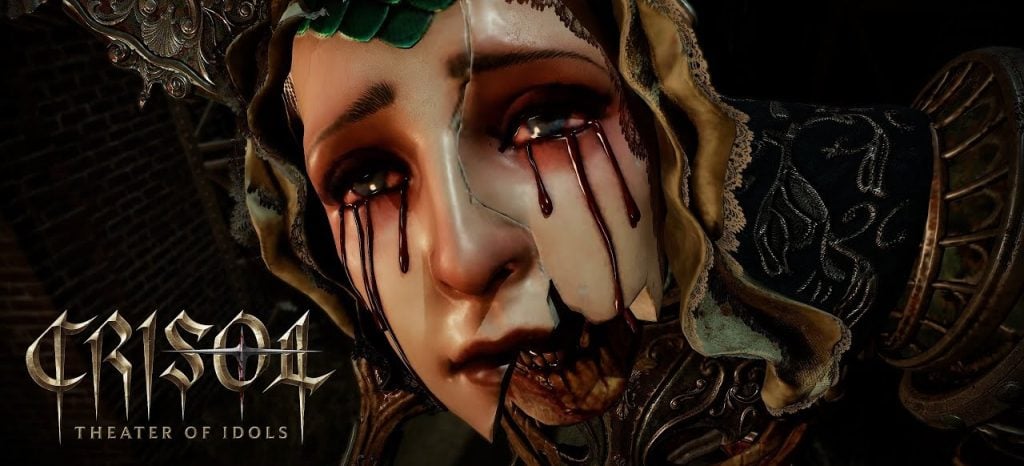





For Rock Steady Row, first-time feature filmmaker Trevor Stevens utilizes a collegiate setting for his post-apocalyptic mash-up that follows a freshman on his first day of school at Rock Steady University, where society has broken down and two fraternities wield all the power over both the student body as well as RSU’s shrewd Dean (played by veteran comedic actor Larry Miller).
Rock Steady Row is set to debut today at the 2018 Slamdance Film Festival (which is being held in Park City, Utah, along with the Sundance Film Festival), and Daily Dead was thrilled to speak with director Stevens about taking his debut to the prestigious fest, how his entire cast and crew came together to support his wild vision for the project, and the thrill of collaborating with legendary funny man Miller.
Congrats on Slamdance, Trevor. I'm sure nerves are kind of settling in a little bit now, but I think you guys should have a lot of fun with this one at the fest. I know I had a blast.
Trevor Stevens: I'm glad to hear that. Everything related to getting here has been absolutely crazy. And we have a huge group that's coming out, too, something like over 40 people from the film are coming up. It's unheard of [laughs]. So we're really excited about that.
There are a lot of aspects that are really fun about Rock Steady Row, but it also feels very socio-politically relevant right now in terms of where things are with the current state of gender issues and stuff like that. How conscientious were you of infusing that into this project? And how did you come to collaborate with Bomani [Story] on it?
Trevor Stevens: Actually, Bomani and I have been friends for a long time, and this is actually an idea that we worked on together for a while. I had the idea to do a spaghetti western, and originally, it was going to be in a high school setting, but we ended up transferring it to college just to change it up a little bit based on a lot of things that we both experienced in college.
I went to Chapman University, and he went to USC, and while he was at USC, he actually had his bike stolen on campus, and he thought that was funny. He had done some research at USC and on other campuses, and discovered a lot of people are always getting their bikes stolen, and they never could find the culprit, like it was this underground bike ring or something.
And then, anybody who's been to college knows about all the problems with student debt, and we saw how relevant that is, so we wanted to create this very bizarro Mad Max reality out of the types of films that we love. We both grew up loving samurai films and spaghetti westerns, but we wanted to put them in a setting that turns those types of films on their head, so instead of these gun-toting gangs, you have fraternities that act the same way. Instead of a sharpened blade, you have pencils, and hidden knives inside of the glasses. The idea was to be very tongue and cheek about it, and to be very exaggerated, very metaphorical about what we're doing.
The Brock Turner situation happened right before we got to the writers' room, so we were aware of that, and we knew that we wanted that to be an element here, too, but we could not have predicted the things that were going to happen in the past year, in terms of the political climate, as we went into production. You have to understand that we filmed this in October 2016, and then our whole political culture changed the following month in November, so things happened very quickly.
This film is really ambitious, where you're using different visual styles at times, and you are working with a pretty fairly large cast, too, using a very specific locale. What were some of the challenges that came along with pulling Rock Steady Row together?
Trevor Stevens: If I'm going to add one thing on top of that, it’s that this was also my first feature, and it was also done for a micro-budget, too. I can't go into the details about the exactness of the budget, but I can tell you that we had to pull favors left and right, and the fact of the matter was this would not have been achievable if it were not for the heart and spirit of this cast and crew. I think the biggest evidence of how invested everyone has been in this project is that we have 40 people coming up, and I didn't have to pull anyone's hand to get here.
The fact that it happened is nothing short of a miracle, but because of that, we were able to pull off things that I want to say no one else would, just because I don't think anyone else would be able to look at us and think that's rational or we should do this movie. And that was what was cool. Everyone was like, "What you're doing is crazy, absolutely crazy." I knew that, but I also knew it was going to be a hell of a lot of fun, even if it was going to be very challenging for everyone. And considering what we had to work with, it's incredible. Everybody really wanted to see this work and were there to make it happen. That was from the top head producer, to the producing team, to every single member of the cast and crew.
Making any kind of art is such a transformative process. Looking back at this experience of making Rock Steady Row, what would you say is the thing that you took away from this experience that perhaps changed you a little bit? Whether it was something that affected you personally, or professionally, or maybe it was a combo of both aspects?
Trevor Stevens: That's a really good question. I feel like there are a lot of things, and if you were to ask me this on a different day, I'd probably tell you something different [laughs]. I do know one of the most important things I learned on this project is to never lose sight of trusting your gut on something, and also being very aware of the people around you and the quality they bring to your work. Something I always did in my shorts in school, that I always wanted to keep with me, is to always listen to your collaborators and make them a part of the project. Because when everyone puts their hands in the pot together, everyone works that much harder, and you have something much more unique. Also, you never want to get stuck in your own head.
Oh, before we go, I wanted to ask about Larry Miller, because I'm a big fan of his. How did you pitch this to him to get him on board for the dean role? One of my favorite movies from when I was a teenager was Necessary Roughness, where he plays another evil dean-type character, so when I saw him pop up in this, I got very excited.
Trevor Stevens: We knew that the dean was going to be a tough one because we had to have someone who could give that right sauciness, that right amount of sarcasm and wit, someone who was very funny, but at the same time could bring in the corruption aspects of what is happening in Rock Steady Row. I also grew up with Larry Miller, whether it be through Seinfeld or Best in Show, so I was a huge fan of him. To ask him to be part of this project was a personal ask, and we wrote him a letter, telling him what the film was about. I didn't even realize until I looked up his podcast and blog that he himself is actually a bit of a spaghetti western fan, which was cool.
Getting to work with him was fantastic, though. He brought so much to this, and we had a whole day just where we were playing with stuff, and it was fantastic. He brought his skills as an improv actor to this, which meant he was able to make up stuff that was completely unique on the spot. And with almost all of his lines, Larry brought in something that was totally from himself, too.